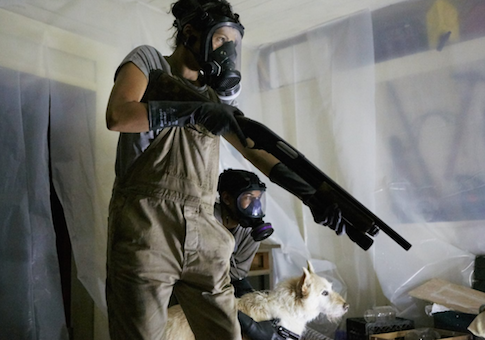It Comes at Night is something like a super-stylish, extended episode of The Walking Dead: a tour-de-force of hateful nihilism that will likely leave audiences feeling far worse about themselves and the state of man than they did 97 minutes previously.
We're dropped into the middle of a plague—its origins unclear; its results quite obvious—where a family of survivors is getting ready to end the life of their sore-riddled grandfather. The work being done is both deeply personal and strangely impersonal; nothing is more heartrending than having to pull the plug on a relative yet nothing is more necessary in the midst of an outbreak. We see the actions and hear the muffled words of distraught, duty-bound loved ones, but director and writer Trey Edward Shults obscures the faces of Paul (Joel Edgerton) and his son, Travis (Kelvin Harrison, Jr.), with gas masks, the glass lenses reflecting only the darkness around them.
It isn't until the old man's funeral pyre lights up that we see their eyes, the horror haunting them, the pressure they're under. Paul, Travis, and family matriarch, Sarah (Carmen Ejogo), are living on borrowed time, barricaded in a house with only one entrance, and only one set of keys to that entrance. The only question is how quickly it will run out.
The sand starts slipping through the hourglass more quickly once Will (Christopher Abbott) breaks into the house and convinces Paul et al to allow him to bring his family to their compound. Will and Kim (Riley Keough) have chickens and goats, and a son, Andrew. The two families try to coexist, but paranoia mounts, anxiety rages, and blood is shed.
It Comes at Night is an easy movie to admire, a technically masterful work that ratchets up the suspense by withholding information and carefully controlling what the camera shows us. Shultz makes expert use of natural light sources, often allowing just enough brightness from lamps or flashlights for us to make out the character the camera is focused on and little else in the frame. The literal darkness creeping in on each shot matches the figurative darkness encircling the increasingly paranoid families.
All that technical skill is employed in an ultimately empty endeavor, however. It Comes at Night is an exercise in relentless nihilism. By withholding key pieces of information and forcing us to distrust everything Will and his family do, It Comes at Night can't really serve as a critique of distrust or paranoia in the face of civilizational breakdown; rather, it revels in paranoia, rubs your face in its fear-mongering.
In short, It Comes at Night is the feel-bad movie of the year. I can't help but feel as if audiences are going to hate it. And I can't blame them if they do.
